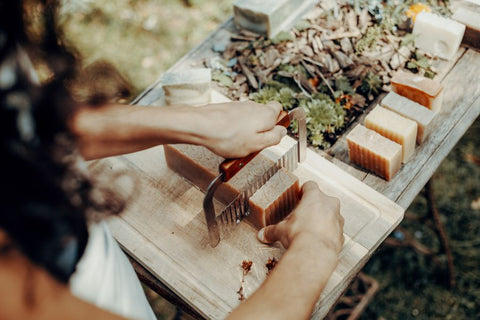The History of Soap, A Journey Through Time

From ancient civilizations to modern-day societies, the story of soap is a testament to human ingenuity and the quest for cleanliness. Join us on a journey through time as we unravel the fascinating history of soap, tracing its origins, evolution, and enduring significance in shaping our hygiene practices and daily lives.
Ancient Origins
The origins of soap can be traced back to ancient civilizations such as the Babylonians, Egyptians, and Sumerians, who discovered the cleansing properties of certain natural substances. Early forms of soap were made by mixing animal fats or plant oils with alkaline substances such as ash or lye, resulting in a rudimentary cleansing agent.
One of the earliest known references to soap dates back to around 2800 BCE in ancient Babylon, where clay tablets detailed the process of soap-making using water, alkali, and cassia oil. Similarly, the ancient Egyptians used a combination of animal and vegetable oils with alkaline salts to create soap-like substances for bathing and washing.
The Spread of Soap-Making Knowledge
Over time, the knowledge of soap-making spread across civilizations, with the Greeks and Romans adopting and refining the techniques developed by their predecessors. In ancient Rome, soap became an essential part of daily hygiene, with public bathhouses equipped with soap for bathing and cleansing.
The Roman historian Pliny the Elder documented the use of soap in his natural history writings, describing the process of soap-making and its various applications. Soap-making workshops, known as "fulleries," flourished in Roman cities, producing soap for both domestic use and trade.
Medieval Europe and the Renaissance
During the Middle Ages, soap-making continued to evolve in Europe, with medieval soap-makers refining techniques and experimenting with new ingredients. The Crusaders returning from the Middle East brought back knowledge of soap-making methods using olive oil, leading to the establishment of soap-making guilds in cities such as Marseille, France.
In the Renaissance era, soap-making experienced further advancements, with the introduction of new ingredients such as lard and tallow, as well as the discovery of the chemical properties of fats and alkalis. The invention of the printing press in the 15th century also facilitated the dissemination of soap-making knowledge through printed manuals and treatises.
Industrial Revolution and Modern Soap-Making
The Industrial Revolution of the 18th and 19th centuries revolutionized the soap-making industry, leading to the mass production of soap using steam-powered machinery and chemical processes. The invention of synthetic detergents in the 20th century further transformed the soap-making landscape, offering new formulations and applications for cleaning and hygiene.
Today, soap-making has become a highly specialized and diversified industry, with a wide range of products catering to different needs and preferences. From traditional bar soaps to liquid soaps, shower gels, and specialty formulations, the choices are endless.
The history of soap is a testament to the human quest for cleanliness and hygiene, spanning millennia of innovation, experimentation, and discovery. From its humble origins in ancient civilizations to its modern-day incarnations, soap continues to play a vital role in our daily lives, keeping us clean, healthy, and refreshed. As we look back on the journey of soap-making through the ages, we gain a deeper appreciation for this essential commodity and its enduring legacy in shaping our societies and cultures.

